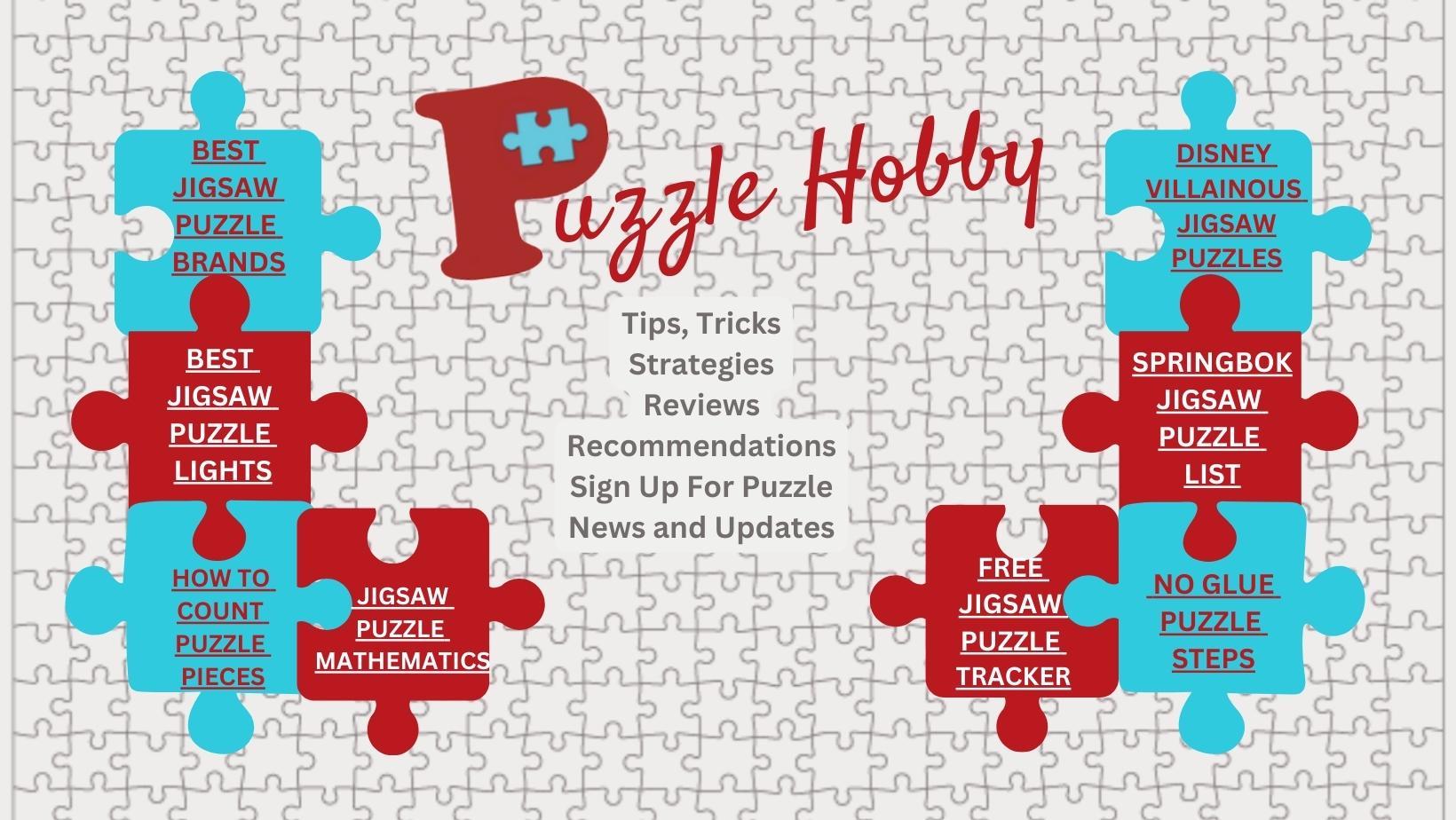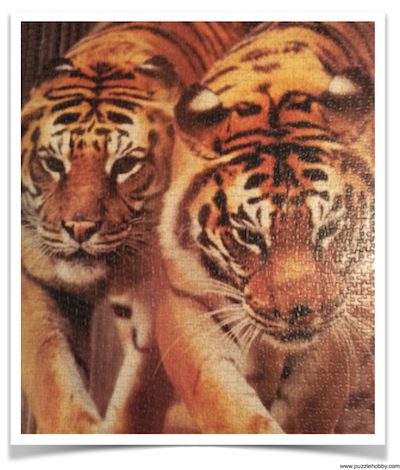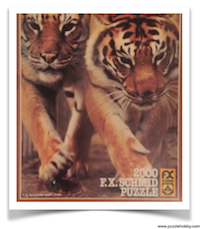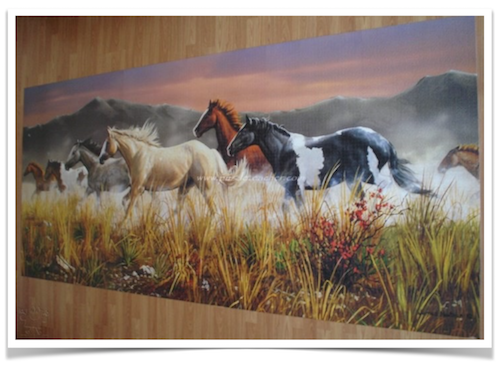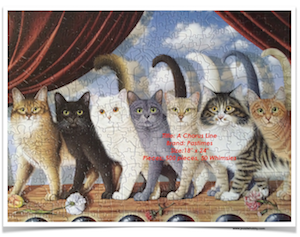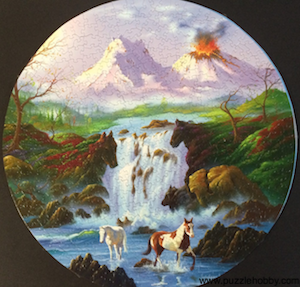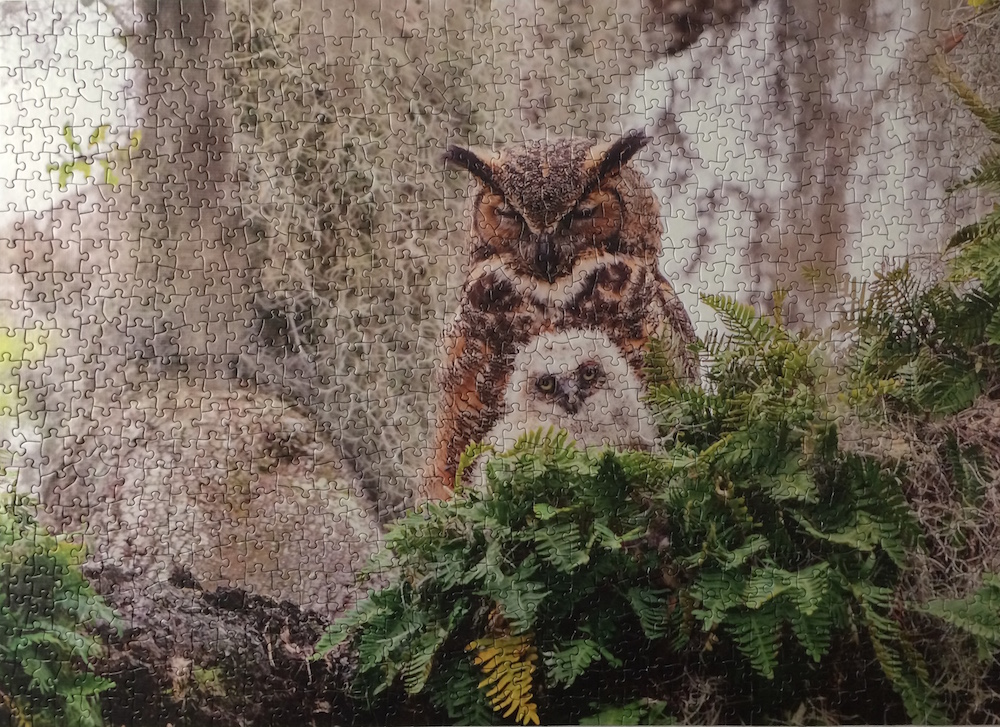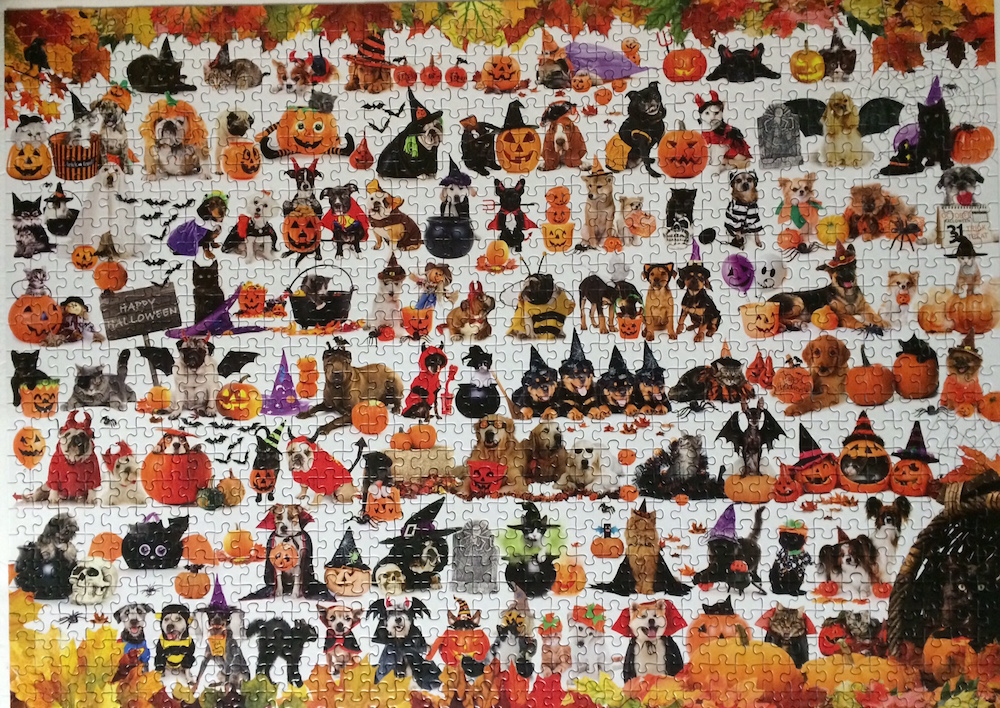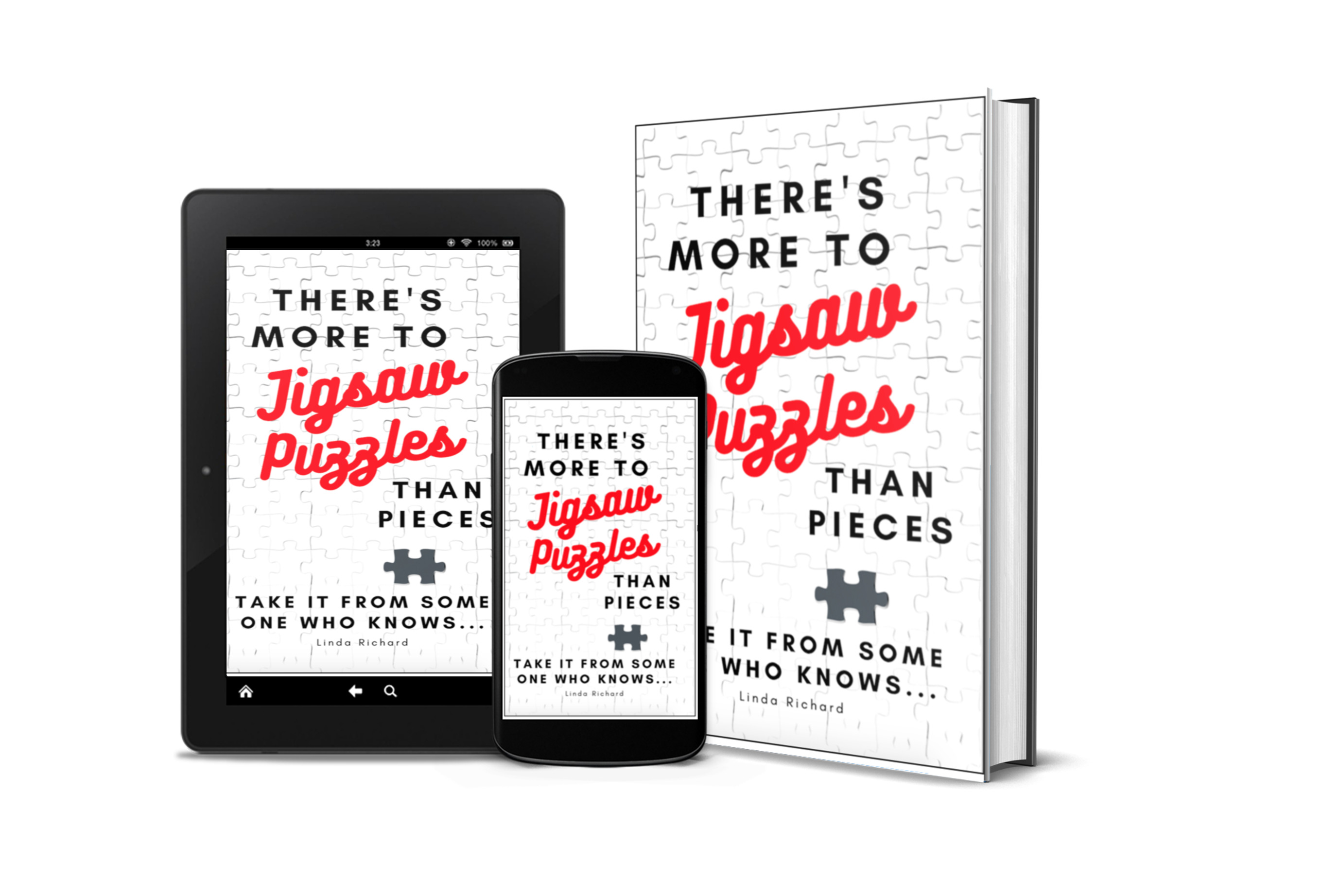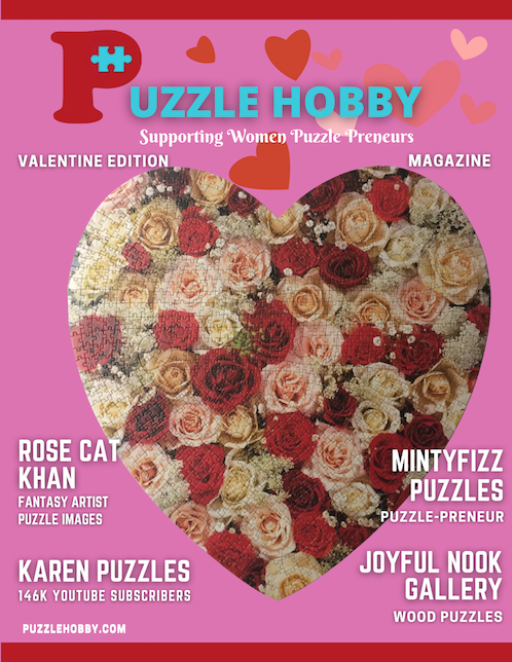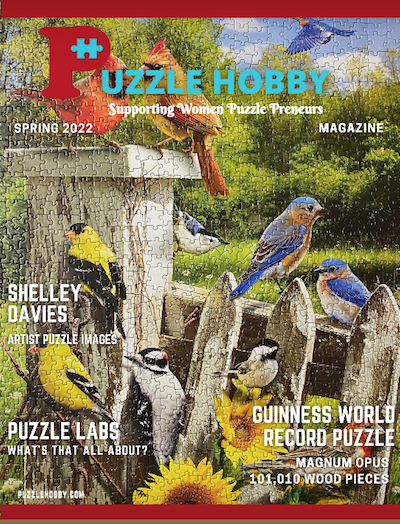 |
 |
- FAQ's 100 Questions
- Best Puzzle Brands
- Activities/Accessories
- Best Puzzle Lights
- Sponsored Reviews
- Sales l Giveaways
- Reap the Benefits
- Get Your Game On!
We are a participant in the Amazon Services LLC Associates Program, an affiliate advertising program designed to provide a means for us to earn fees by linking to Amazon.com and affiliated sites. Also, some of our posts contain other affiliate links and we will be compensated if you make a purchase after clicking on our links.


Animal Jigsaw Puzzles Gallery
I'll say it again....some of the best jigsaw puzzles are images of animals.
We are very fortunate that artists, photographers and companies provide us with a plethora of animal images. I like to think of animals being Nature's gift to us.
There seems to be an endless supply of Nature's gifts and I have one of the most beautiful ones too! Take a look at the following....
FX Schmid, Bengal Tigers, 2000 Pieces - 36.5x25.75" or 92x65cm
This was very challenging to complete - look at the colour blends. But when I completed it... I was thrilled. The size of this image is huge and 2000 pieces to put these 2 animals together required a lot of patience and many hours. Being an FX Schmid, the quality was great but wow!!!....a real achievement indeed!!!!
Title: A Chorus Line
Brand: Pastimes Puzzles
Size:18" x 24"
Pieces: 500 pieces, 50 Whimsies
To read more about this entry please CLICK HERE
Brand: Sunsout
Title: Horses in the Wind - Artist: Jim Warren
500 pieces, 19 inches round
To read my review please CLICK HERE
There's a lot more to come..........
- Best Quality Jigsaw Puzzles
- 43 Best Jigsaw Puzzle Brands
- 5 Best Jigsaw Puzzle Lights
- 11 Best Jigsaw Puzzle Tables
- 23 Best Jigsaw Puzzle Mats
- 85 Best Shaped Jigsaw Puzzles
- 29 Disney Villainous Jigsaw Puzzles
- Best Jigsaw Puzzles Scoops
- Best Jigsaw Puzzle Glue
- No Glue Method for Puzzles
- 115 Cobble Hill Jigsaw Puzzles
- 33 JaCaRou Jigsaw Puzzles
- 9 WerkShoppe Jigsaw Puzzles
- 5 Grateful House Jigsaw Puzzles
- 95 Eurographics Jigsaw Puzzles
- 7 Hennessy Jigsaw Puzzles
- 11 Ceaco Jigsaw Puzzles
- 29 Cloudberries Jigsaw Puzzles
- 2 Wentworth Jigsaw Puzzles
- _______Advertisement_______
We have collected a massive list of jigsaw puzzles in numerous categories on our Amazon Store link. It's a quick way to browse most current puzzles and/or specific seasons, accessories and themes. Makes for a terrific one-stop jigsaw puzzle gift giving shopping centre. CLICK HERE
About Jigsaw Puzzles: Unveiling the Benefits of Doing Jigsaw Puzzles
A Therapeutic Journey
Jigsaw puzzles have long captivated individuals of all ages, offering not only a fun pastime but also a myriad of benefits for mental well-being. From enhancing cognitive skills to promoting relaxation, the act of piecing together puzzles goes beyond entertainment. In this article, we explore the remarkable benefits of engaging in jigsaw puzzles, shedding light on the positive effects they have on our minds and bodies.
- Cognitive Stimulation: Jigsaw puzzles serve as a workout for the brain, stimulating cognitive functions such as critical thinking, problem-solving, and spatial reasoning. As we examine puzzle pieces, analyze patterns, and make connections, our brains become engaged in a captivating mental exercise.
- Improved Memory: Engaging in jigsaw puzzles helps enhance short-term memory and reinforce long-term memory. Remembering shapes, colors, and patterns, and recalling their positions throughout the puzzle aids in memory retention and retrieval.
- Focus and Concentration: Solving jigsaw puzzles requires sustained focus and concentration. By immersing ourselves in the task at hand, we train our minds to block out distractions, strengthen our attention span, and improve our ability to stay focused on a specific goal.
- Stress Relief: Puzzling acts as a therapeutic escape from the stresses of everyday life. As we immerse ourselves in the puzzle-solving process, our minds become engrossed, creating a sense of mindfulness and providing a temporary respite from worries and anxieties.
- Boost in Dopamine Levels: Completing a puzzle triggers the release of dopamine, a neurotransmitter associated with pleasure and reward. This surge in dopamine creates a sense of accomplishment and satisfaction, reinforcing the positive feelings associated with puzzle solving.
- Enhanced Fine Motor Skills: Manipulating puzzle pieces and fitting them together requires precise hand-eye coordination and fine motor skills. Regularly engaging in puzzles can help improve dexterity, agility, and the coordination between our hands and eyes.
- Social Interaction: Puzzling can be a social activity that fosters connection and collaboration. Solving puzzles with family or friends encourages communication, teamwork, and shared accomplishment, enhancing social bonds and creating lasting memories.
- Patience and Perseverance: Completing a complex puzzle requires patience and perseverance. As we encounter challenges and setbacks, we learn to persist, develop problem-solving strategies, and build resilience—a valuable skillset that extends beyond puzzle-solving.
- Mental Relaxation and Mindfulness: The meditative nature of jigsaw puzzles can induce a state of relaxation, promoting mindfulness and reducing stress levels. The repetitive and calming motions of sorting and connecting pieces can have a soothing effect on the mind, allowing for a tranquil escape from daily pressures.
- Sense of Achievement: The satisfaction of placing that final puzzle piece and witnessing the complete image provides a profound sense of achievement. This sense of accomplishment boosts self-esteem, instills a sense of pride, and fosters a positive mindset.
By embracing the benefits of jigsaw puzzles, we unlock not only an enjoyable hobby but also a path to mental well-being. Whether you're seeking cognitive stimulation, stress relief, or a moment of mindfulness, engaging in puzzles can enrich your life and provide a therapeutic journey that transcends the puzzle board. So gather your puzzles, sharpen your focus, and embark on this fulfilling adventure of piecing together fragments to create something beautiful and whole.
(ChatGPT, personal communication, June 20, 2023)
About: Mastering the Art of Choosing the Right Jigsaw Puzzle
Tips to Avoid Buying Overwhelmingly Difficult Images
Jigsaw puzzles offer a delightful challenge, but there are times when the level of difficulty can be overwhelming. Whether you're a seasoned puzzler or a novice looking for an enjoyable experience, it's important to choose the right puzzle image that matches your skill level and personal preferences. In this article, we'll explore the world of difficult jigsaw puzzles and provide you with a list of tips to help you avoid buying images that might leave you feeling frustrated.
1. Know Your Skill Level
Understanding your own puzzle-solving skills is key when selecting a jigsaw puzzle. Be honest with yourself about your experience and comfort level. If you're a beginner, it's best to start with puzzles that have a lower piece count and simpler imagery. As you gain confidence and experience, you can gradually challenge yourself with more complex puzzles.
2. Consider the Piece Count
The number of puzzle pieces directly affects the difficulty level. Larger piece counts, such as 1,000 pieces or more, can be more time-consuming and mentally demanding. If you prefer a less challenging experience, opt for puzzles with smaller piece counts, such as 500 pieces or even fewer.
3. Analyze the Imagery
Before purchasing a puzzle, carefully examine the image. Complex and intricate designs, such as landscapes with numerous details or abstract patterns, tend to be more challenging. If you're looking for a less daunting puzzle, choose images with clearly defined sections, distinct colors, or simpler motifs.
4. Read Product Descriptions and Reviews
Take the time to read product descriptions and reviews. Puzzle manufacturers often provide information about the level of difficulty, which can help you make an informed decision. Additionally, reading reviews from other puzzlers can give you insights into the puzzle's complexity and whether it aligns with your preferences.
5. Look for Beginner-Friendly Collections
Many puzzle companies offer collections specifically designed for beginners. These collections often feature puzzles with larger pieces, simpler imagery, or even hints and guidance to assist you along the way. Exploring these beginner-friendly options can be a great way to ease into the world of jigsaw puzzles.
6. Seek Variety in Piece Shapes
Some puzzles feature unique piece shapes that can add an extra layer of difficulty. If you're looking for a more accessible experience, consider puzzles with standard grid-shaped pieces. However, if you enjoy a challenge, look for puzzles with irregular or whimsical piece shapes, as they can make the assembly process more complex and engaging.
7. Check for Puzzle-Specific Features
Certain puzzle manufacturers offer features to indicate the level of difficulty. For example, some puzzles may have a "difficulty rating" on the packaging or specify whether they are suitable for beginners, intermediate puzzlers, or advanced enthusiasts. These indicators can be valuable in making an informed decision.
8. Consider Collaborations with Artists
Many jigsaw puzzle companies collaborate with renowned artists, resulting in a wide range of puzzle images with varying levels of difficulty. Some artists may have a distinctive style that makes their puzzles more challenging, while others may focus on creating accessible and enjoyable designs. Research the artist's work and style to ensure it aligns with your preferences and skill level.
9. Seek Recommendations from Fellow Puzzlers
Engaging with the puzzle community, whether through online forums, social media groups, or local puzzle clubs, can provide valuable insights and recommendations. Experienced puzzlers can share their thoughts on specific puzzle images and brands, helping you make informed choices.
10. Trust Your Instincts
Ultimately, trust your instincts and choose puzzles that genuinely spark joy and interest for you. While it's important to consider the difficulty level, it's equally crucial to select images that you find visually appealing and personally satisfying. Enjoying the process of assembling a puzzle is just as important as the challenge itself.
By following these tips, you'll be better equipped to choose jigsaw puzzles that match your skill level and provide an enjoyable experience. Remember, puzzles should be a source of relaxation and fun, so don't be afraid to explore different options and challenge yourself while staying within your comfort zone. Happy puzzling!
(ChatGPT, personal communication, June 20, 2023)
